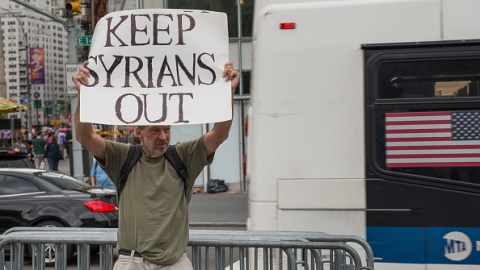Pitifully Few — U.S. to Take Only 10,000 Syrian Refugees

Last week, the Syrian refugee crisis came to a head when over 4,000 migrant refugees were detained at the Hungarian border. Since the conflict began in 2012, over 4 million people have fled Syria in search of safety, food, and shelter. Now European countries are scrambling to deal with the influx of refugees, but shouldn’t they have seen this coming?
Over 200,000 people have been killed since the war started, but conditions are so bad, it’s likely that number is a conservative estimate. To put it in perspective, imagine the population of Newark or Baton Rouge being completely wiped out by violence. Now imagine you live in New Jersey or Louisiana — wouldn’t you try to leave?
So far, the White House has promised to allow 10,000 Syrians into the country, but that’s a far cry from Turkey’s already 2 million.
The majority of refugees have fled to other countries in the Middle East — mainly, Turkey, Lebanon, and Jordan — who already were dealing with refugees from other conflicts in the region. It’s not surprising then that Syrians would want to travel farther into Europe because these countries are struggling to keep pace with the influx of people. Lebanon’s population alone has increased by 25 percent over the past four years from taking in Syrian immigrants.
And the U.S.? Well, it’s taken in around 1,500 people, or the enrollment size of a small liberal arts college. The private advocacy group U.S. Committee for Refugees and Immigrants would like to resettle 100,000 people by the end of next year — an ambitious number, but not impossible, considering that the U.S. government resettled 125,00 Vietnamese in 1975 and the same number of Cubans in 1980. So far, the White House has promised to allow 10,000 Syrians into the country, but that’s a far cry from Turkey’s already 2 million.
The private advocacy group U.S. Committee for Refugees and Immigrants would like to resettle 100,000 people by the end of next year.
There are arguments for not taking in refugees — such as House Homeland Security Committee Chairman Mike McCaul’s rationale that doing so would invite terrorism — but the reality is that we destabilized the region, which has contributed to the ongoing power struggle between Assad’s government and the Islamic State. Families escaping bloodshed in search of stability are hardly candidates for terrorism. Moreover, most refugees in ill-equipped camps at the Turkish and Lebanese borders are young people, and the longer they languish, the more likely they will be to consider violence as a means to an end.
Since 9/11, we’ve tried fighting violence with violence and are now faced with the threat of ISIS coupled with the worst humanitarian crisis since WWII. Wouldn’t it make since then to help Syrian (and Afghani and Iraqi) refugees find better lives in places that are not plagued with extremism? The way to enervating the power of rogue states and the influence of violent radicals may very well be providing asylum and opportunities to those people who want no part of either.
—
Daphne Muller is a New York City-based writer who has written for Salon, Ms. Magazine, The Huffington Post, and reviewed books for ELLE and Publishers Weekly. Most recently, she completed a novel and screenplay. You can follow her on Instagram @daphonay and on Twitter @DaphneEMuller.





